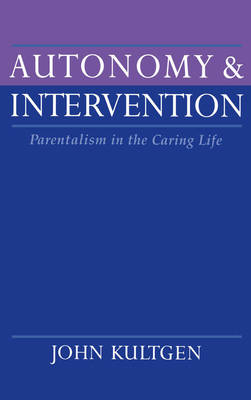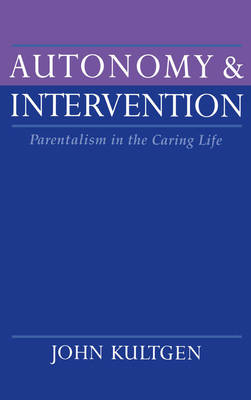
- Afhalen na 1 uur in een winkel met voorraad
- Gratis thuislevering in België vanaf € 30
- Ruim aanbod met 7 miljoen producten
- Afhalen na 1 uur in een winkel met voorraad
- Gratis thuislevering in België vanaf € 30
- Ruim aanbod met 7 miljoen producten
Zoeken
€ 271,45
+ 542 punten
Omschrijving
The basic relationship between people should be care, and the caring life is the highest which humans can live. Unfortunately, care that is not thoughtful slides into illegitimate intrusion on autonomy. Autonomy is a basic good, and we should not abridge it without good reason. On the other hand, it is not the only good. We must sometimes intervene in the lives of others to protect them from grave harms or provide them with important benefits. The reflective person, therefore, needs guidelines for caring. Some contemporary moralists condemn paternalism categorically. This work examines weaknesses in their arguments and proposes new guidelines for paternalism, which it calls "parentalism" to avoid the patriarchal connotations of the old term. Its antiparentalism is more moderate than standard antipaternalism based on an exaggerated respect for autonomy. The work explores implications for both the personal sphere of interactions between individuals, such as friends and family members, and the public sphere of institutions, legislation, and the professional practices.
Specificaties
Betrokkenen
- Auteur(s):
- Uitgeverij:
Inhoud
- Aantal bladzijden:
- 280
- Taal:
- Engels
Eigenschappen
- Productcode (EAN):
- 9780195085310
- Verschijningsdatum:
- 16/02/1995
- Uitvoering:
- Hardcover
- Formaat:
- Genaaid
- Afmetingen:
- 161 mm x 237 mm
- Gewicht:
- 616 g

Alleen bij Standaard Boekhandel
+ 542 punten op je klantenkaart van Standaard Boekhandel
Beoordelingen
We publiceren alleen reviews die voldoen aan de voorwaarden voor reviews. Bekijk onze voorwaarden voor reviews.











